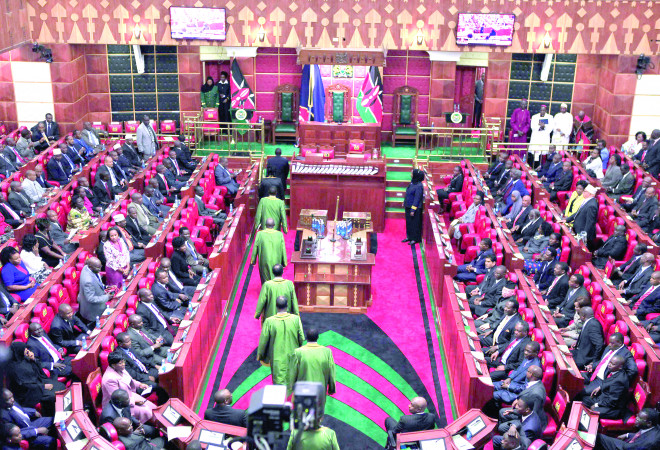In record of Bills, MPs excel on Uhuru’s Big 4, but fail Wanjiku
By Mercy.Mwai, June 24, 2022The Twelveth Parliament focused more on passing legislation to implement President Uhuru Kenyatta’s Big Four agenda than on being Wanjiku’s defender as anticipated by the Constitution, a new report shows.
The report by Mzalendo Trust takes stock of the sitting lawmakers. It shows that although the august House weathered political tensions at the onset of its term, the famous Handshake and the resultant fallouts and new alliances shifted its focus and influenced its work.
Mzalendo Trust executive director Caroline Gaita says failure to live up to public expectations on certain pertinent issues is what will define the legacy of the House.
According to Gaita, key legislations that would have sealed the various loopholes include the Anti-Corruption and Economic Crimes (Amendment) Bill by Kiharu MP Ndindi Nyoro. It sought to double the fines for those found culpable of corruption.
Left by wayside
Another legislation is the Public Participation Bill sponsored by Busia Senator Amos Wako, whose aim was to provide a framework for public participation.
Others are the Statute Law (Miscellaneous Amendments) Bill, 2019 which sought to bring lawyers into the disclosures under the Proceeds and Crimes and Anti-Money Laundering Act (POCAMLA). Yet another one is the Appointments (Parliamentary Approval) (Amendment) Bill which sought to ensure the loopholes in vetting public officials were sealed.
They were championed by Kisumu East MP Shakeel Shabir.
“The 12th House had an opportunity to fix several issues Kenyans have been grappling with, including corruption, public participation, the two-thirds gender rule and inclusion of youth and women through the various legislative proposals initiated. Unfortunately, the Bills did not see the light of day as some were lost in various stages and others lapsed after Parliament adjourned Sine Die”, she says.
Leadership purge
According to the report, the impact of the Handshake on the House was also imminent, as the Executive flexed its powers. An example is the leadership purge of 2020 that saw the House and Committee leaderships replaced with members considered to be loyal to the ruling parties.
In the National Assembly, Kipipiri MP Amos Kimunya replaced Garissa Township MP Aden Duale as Leader of the Majority Party; Navakholo MP Emmanuel Wangwe replaced Mumias East MP Benjamin Washiali as Majority Chief Whip, Igembe North MP Maoka Maore replaced nominated MP Cecily Mbarire as Deputy Chief Whip, while Tongaren MP Eseli Simiyu replaced Kiminini MP Chris Wamalwa as Deputy Minority Whip.
In the Senate, Uasin Gishu Senator Margaret Kamar replaced Tharaka Nithi Senator Kindiki Kithure as Deputy Speaker, West Pokot Senator Samuel Poghisio replaced Elgeyo Marakwet Senator Kipchumba Murkomen as Leader of the Majority Party, while Murang’a Senator Irungu Kang’ata replaced Nakuru Senator Susan Kihika — who was later replaced by Kiambu Senator Kimani Wamatangi as Chief Whip.
The Handshake, the report notes, also enabled the Executive to have its way in the passage of legislation, with the most notable being the Constitutional Amendment Bill (popularly known as the BBI Bill), 2019; the Small Claims Court (Amendment) Bill, 2020; and the Political Parties (Amendment) Bill, 2021.
Sailed through
Other instances include the increase of the debt ceiling from the Sh6 trillion to Sh9 trillion in 2019, and from Sh9 trillion to Sh10 trillion recently, the increase of VAT from 14 per cent to 16 per cent, and the vetting of appointees to key positions which, with a few exceptions, sailed through with little or no opposition.
“Overall, the 12th Parliament should have done more towards securing its legacy. The onus is now heavily on the 13th Parliament to proceed with speed, especially on the enactment of key pending legislation, addressing the issue of public debt, passing campaign financing regulations and addressing issues affecting the citizens, including the high cost of living,” reads the report.
